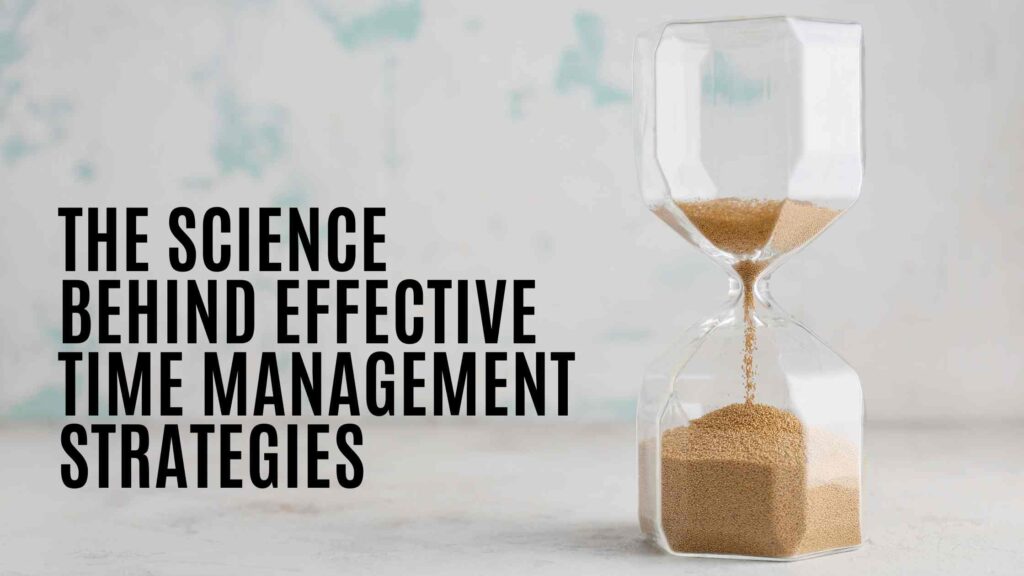Have you ever felt overwhelmed by the sheer number of tasks you’ve got to handle? Or do you sometimes wonder where your entire day went? We’ve all been there. The key to taking control of your time lies in mastering time management. And guess what? There’s actual science behind making the most of every minute. Let’s unpack the mystery and discover how time management, backed by scientific principles, reshapes our daily routines and boosts productivity.
The Biological Clock: Tuning into Your Circadian Rhythms
Our bodies have an internal clock called the circadian rhythm. This 24-hour cycle affects our energy levels, alertness, and even mood. By understanding and syncing with our natural rhythms, we can determine our most productive times of the day. It’s like swimming with the current instead of against it.
The Power of Breaks: The Pomodoro Technique
Have you ever heard of working in short bursts with regular breaks? That’s the Pomodoro Technique. The science behind it is that our brain’s attention and focus can only be sustained effectively for a specific duration. Taking planned breaks can refresh the mind and sustain high levels of concentration. It’s not about working harder but smarter.
The Art of Prioritization: Project Management Tools to the Rescue
Effective time management isn’t just about clocking hours. It’s about prioritizing tasks. In today’s digital age, numerous project management tools, such as the versatile gantt chart, can help streamline tasks, set deadlines, and allocate resources efficiently. Using these tools it’s like having a roadmap to your day, week, or even year, guiding you on what to tackle next.

The Two-Minute Rule: Quick Wins Matter
If something takes less than two minutes, do it immediately. This principle comes from the idea that the energy and time spent thinking about a small task often exceed doing the task itself. By addressing these “quick wins,” you declutter your task list and gain momentum.
Batch Processing: Group Similar Tasks
Instead of jumping between diverse tasks, science suggests grouping similar tasks (like replying to emails or scheduling meetings) can boost efficiency. It reduces the mental load and effort of switching between different types of activities.
Limiting Multitasking: The Myth of Doing It All
Contrary to popular belief, multitasking can reduce your efficiency. Scientific studies show that juggling multiple tasks divides your attention and can lead to more errors. Focusing on one thing at a time ensures that it gets your full attention and is done more efficiently
Deep Dive: Facts and Findings on Time Management
Early Birds and Night Owls: Not everyone’s peak productivity times are the same. Some people are more alert in the morning, while others find their stride in the evening.
80/20 Principle: The Pareto Principle suggests that 80% of results come from 20% of efforts. Identifying and focusing on that crucial 20% can significantly boost outcomes.
Task Uniformity: Similar tasks often take a similar amount of time. By gauging how long one task takes, you can estimate the duration for similar tasks in the future.
Distraction Dilemma: On average, it takes about 23 minutes to return to a task after being distracted. Reducing interruptions can significantly enhance productivity.
Memory Boost: Regular breaks can enhance memory recall and creative thinking, making problem-solving more efficient.
Harnessing the Power of Time
To effectively utilize these strategies:
- Track Your Time: Spend a week noting down how you spend your time. This will give you insights into potential areas of improvement.
- Set Clear Goals: Knowing your goals can help prioritize tasks.
- Stay Flexible: While planning is essential, adapting to changes is equally crucial.
In conclusion, time management is more than just to-do lists and alarms. It’s a science-backed approach to maximizing efficiency and reducing stress. Whether by syncing with our biological clocks or leveraging cutting-edge project management tools, understanding the science behind these strategies can transform how we approach our days. So, the next time you plan your schedule, remember: you’re not just organizing tasks; you’re harnessing the power of scientific principles to lead a more productive and balanced life.










